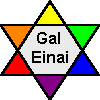Kabbalah and Psychology
Kabbalah and
Mathematics
Kabbalah
and Science
Kabbalah
and Medicine
Kabbalah
and Jewish Meditation
Living With
the Times
The Jewish Home and
Family
Mashiach and
Redemption
The Land of
Israel
Jews and Non-Jews
Rabbinic
Proclamations
|
|
Part
38
The Antidote of Selflessness
The
property of the soul which serves as an antidote for the problems of the ego
that block effective self-criticism is selflessness. And selflessness in
turn is rooted in the sefirah of chochmah ("wisdom.") We see
this relationship between self-criticism and selflessness on several levels:
-
Chochmah--through
a permutation of letters--is understood to be the "power" (koach)
of "what" (mah). It represents the power that comes from the
ultimate eviction of ego and selfishness blocking the flow of Divine
force which seeks to enlighten and empower us, but which can only do so
to the extent that there is "space" within us for something greater than
ourselves. In other words, the flow of the Divine force in us is
proportional to our level of selflessness. The entire purpose of the
discipline of self-criticism is to dissolve the armor of
self-justifications which fortify the ego and block our surrender to
God, the prerequisite for attaining true wisdom.
-
Chochmah
represents the instantaneous "flash" of insight, that appears as a bolt
of lightning in the mind. It is a moment of intense clarity and deepened
awareness that recedes just as quickly back into the super-conscious
realms from which it came, leaving only an impression of its truths. If
it is going to have a lasting affect on our consciousness, then it must
be developed and concretized by the analytical faculties of the sefirah
of binah ("understanding"). The word for a bolt of lightning
in Hebrew is barak, a permutation of the same three Hebrew
letters which form the root of the word bikoret, meaning "criticism."
Since chochmah is depicted in Kabbalah as lightning, this
establishes another correspondence between self-criticism and wisdom.
-
The
inner quality of chochmah is selflessness, and this must be the
beginning and the end of any attempt at self-criticism. All
rectification of self must derive from true wisdom (which is
selflessness) if it is going to succeed in its goal of breaking our
attachments and preoccupations with self. Otherwise, it is liable to
have the opposite effect, where we become obsessively concerned with
ourselves, but now, in the "noble" guise of engaging in self-criticism;
this is false humility.
Selflessness
creates the possibility of true wisdom and self-awareness. The Talmud
defines the wise person as one who "knows his place." We know our place when
we have realistic expectations of our strengths, weaknesses and
capabilities. A sign of false or superficial wisdom is having unrealistic
expectations of self or others.
It
is wise to keep in mind the words of King Solomon in the Book of
Ecclesiastes: "There isn't a man on the earth that is so holy that he does
only good and does not transgress." The Ba'al Shem Tov, commenting on this
verse, explains that if the ego derives pleasure or claims credit for its
acts of kindness, then the seemingly selfless deed is tainted (even if to a
minute degree) by arrogance. Yet we cannot completely overcome this trait,
because, while we remain in our physical bodies, it is impossible for us to
completely transcend the "self." Nevertheless, we must try to minimize that
sin of arrogance as much as possible by striving toward selflessness. The
tool for doing so is self-criticism which leads to true wisdom.
 |
The
material contained on this site has been prepared by
Gal Einai Institute
a non-profit organization dedicated to disseminating and implementing
the inner wisdom of Torah -- Kabbalah and Chassidut |
 |
|
|
A
new chapter of Kabbalah and Education is both:
uploaded to the web every week
and also sent out via the
Inner Dimension (free) weekly Torah message email list.
Click
here to subscribe
|

